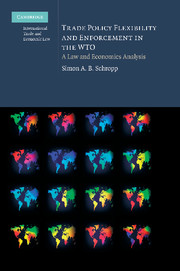Book contents
- Frontmatter
- Contents
- List of figures
- List of abbreviations
- Acknowledgements
- Foreword
- 1 Introduction: trade policy flexibility in the WTO – vice or virtue?
- PART I An introduction to incomplete contracting
- PART II Theorizing about the WTO as an incomplete contract
- PART III Flexibility and enforcement in the WTO: towards an agenda for reform
- 6 Theorizing about the WTO as an efficient “breach” contract
- 7 Towards an efficient “breach” contract: an agenda for reform
- Bibliography
- Index
7 - Towards an efficient “breach” contract: an agenda for reform
Published online by Cambridge University Press: 05 May 2010
- Frontmatter
- Contents
- List of figures
- List of abbreviations
- Acknowledgements
- Foreword
- 1 Introduction: trade policy flexibility in the WTO – vice or virtue?
- PART I An introduction to incomplete contracting
- PART II Theorizing about the WTO as an incomplete contract
- PART III Flexibility and enforcement in the WTO: towards an agenda for reform
- 6 Theorizing about the WTO as an efficient “breach” contract
- 7 Towards an efficient “breach” contract: an agenda for reform
- Bibliography
- Index
Summary
Having assessed in the previous chapter what the WTO would look like as an EBC and how reasonably rational governments would optimally design a system of contractual non-performance, we can now proceed to suggesting an agenda for reform. This chapter provides a conclusion to the entire study, precisely because without the detailed analysis of previous chapters this reform agenda would be just another ad hoc change request to join the ranks of the many that WTO scholarship has seen so far. The following reform proposals are built on firm foundations, since they lay out a politically realistic (read: incentive compatible), systemically viable, and efficient system of flexibility and enforcement in the WTO.
The following presents ways in which the contemporary WTO could be shifted onto the trajectory of the achievable first-best: the efficient “breach” contract. The results of Chapter 6, which characterized the hypothetical bargain of the vWTO, can be operationalized and put into effect by changing the text of the current contract. We have worked out a “shortlist” and a richer catalog of reform suggestions. The shortlist (section 7.1) contains those improvements towards an efficient “breach” contract which are most urgent and/or possess the largest reform leverage. The extensive catalog (section 7.2) sketches comprehensive and long-term changes and amendments required to develop a coherent and sustainable institutional system of non-performance in the WTO. Section 7.3 concludes and presents a research outlook.
- Type
- Chapter
- Information
- Trade Policy Flexibility and Enforcement in the WTOA Law and Economics Analysis, pp. 308 - 323Publisher: Cambridge University PressPrint publication year: 2009



